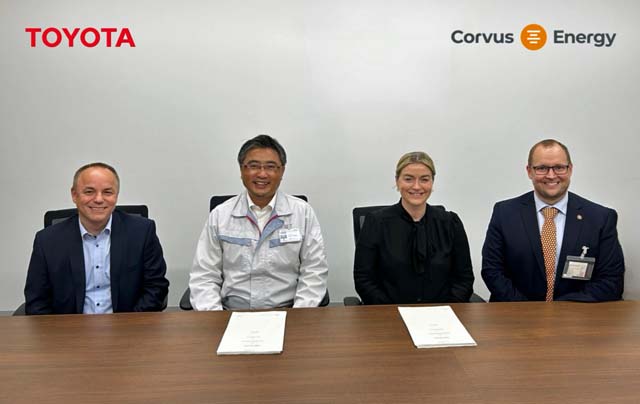In January 2021 Corvus Energy launched the H2NOR project aiming to develop the next-generation fuel cell based on fuel cell technology from Toyota; the product was launched in June 2023 and the first contract for the inherently gas-safe Pelican Fuel Cell was signed in September 2023.
A long-term supply agreement was recently signed by participants from Toyota and from Corvus, strengthening the almost three-year-long collaboration between the companies.
Mette Rokne Hanestad, Interim CEO and CFO, Corvus Energy said: “This agreement marks another significant milestone on the road to decarbonizing shipping. Hydrogen fuel cells will be key in decarbonising various near-shore vessels in addition to short-sea cargo and passenger ships. The agreement we have signed gives us a predictable supply of core technology and enables Corvus to take the marine fuel cell development into the next phase of commercialisation and scale. The support we have been given from Toyota in the development phase has been phenomenal and has strengthened our relationship. We are very proud that Toyota chose Corvus as their pathway to large marine ships allowing us to work with such a world-leading company.”
Kristian Holmefjord, Corvus EVP and Project Director of Fuel Cells, added: “After three years of close collaboration we have now built a strong foundation to take our groundbreaking development to the market in full scale. Toyota is one of the world’s biggest producers of fuel cells and will continue to be so in the foreseeable future. Having the backbone of their support and supply means we will always bring the best fuel cell technology into the marine industry. On top of that, the combination of batteries and fuel cells is ideal. Combining our industry-leading maritime batteries with what we believe will be the industry-leading marine hydrogen fuel cell system, The Pelican Fuel Cell, will be the key to driving innovation further to power a clean future.”
The Corvus Pelican Hydrogen Fuel Cell System (FCS) is specifically built as a range extender for near-shore and short-sea vessels that are not able to reach zero-emission operations on batteries alone. The system combines proven technology from Toyota with an inherently gas-safe design, which makes this what is thought to be one of the safest and most advanced marine fuel cell systems available as it can be placed anywhere onboard a ship without additional safety measures.



